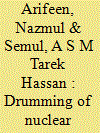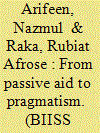| Srl | Item |
| 1 |
ID:
157613


|
|
|
|
|
| Summary/Abstract |
After Pyongyang’s test of intercontinental ballistic missiles (ICBM) capable of
hitting the mainland United States (US), the possibility of an Armageddon or the
‘end of the world’ seems more realistic than ever. In particular, North Korea’s threat
to take out the US military base in Guam has altered the strategic equations.
Given the recent escalation of tension between North Korea and global powers,
this paper provides an insight into the triggers and the credibility of North
Korean nuclear threats with a view to analysing way out for de-escalation. By
exploring the triggering factors behind the standoff and their ramifications, it
contends that policy dichotomy of great powers, unrestrained rhetoric from
the key players and ill-suited bargaining tactics may lead to miscalculations by
adversaries, potentially aggravating the crisis. Based on these arguments, the
paper ends with an exposition of possible options to de-escalate the situation.
|
|
|
|
|
|
|
|
|
|
|
|
|
|
|
|
| 2 |
ID:
165531


|
|
|
|
|
| Summary/Abstract |
The ideas espoused in ‘diplomacy’ inherently contradict what ‘humanitarianism’ entails, if one goes by the realist or neoliberal institutionalist schools in international relations. They contend that states, whose primary concerns are to maximize power or security in an anarchic international system, cannot have the indulgence to be humanitarian, theoretically speaking at the very least. Nonetheless, humanitarian diplomacy has been instrumental in resolving intractable conflicts and severe crises that states and the United Nations (UN) were unable to fix. This paper explores why the idea of humanitarian diplomacy has not caught on by focusing on its tension with state-centrism, legal weaknesses and the problem of politicization by powerful states. An evolving and thriving praxis of humanitarianism is, then, discussed as the international community strives to ameliorate human sufferings. Despite tensions arising mostly out of how humanitarian diplomacy has been (ab) used by powerful states, the paper traces new trends where states are shifting their focus from passive aid to pragmatism. Based on a case study of humanitarian diplomacy in the Rohingya crisis, the paper offers some evidence on how states utilize humanitarian diplomatic instruments.
|
|
|
|
|
|
|
|
|
|
|
|
|
|
|
|